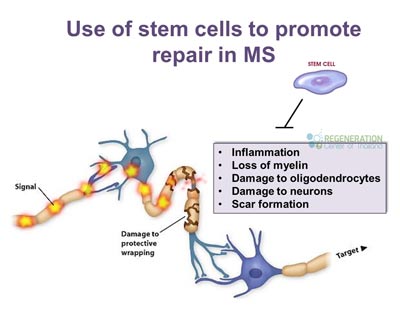Facts About Regenerative Medicine For Multiple Sclerosis Revealed
Wiki Article
All About Regenerative Medicine For Multiple Sclerosis
Table of ContentsExamine This Report about Regenerative Medicine For Multiple SclerosisFacts About Regenerative Medicine For Multiple Sclerosis Uncovered9 Easy Facts About Regenerative Medicine For Multiple Sclerosis DescribedThings about Regenerative Medicine For Multiple SclerosisLittle Known Questions About Regenerative Medicine For Multiple Sclerosis.The Only Guide to Regenerative Medicine For Multiple SclerosisHow Regenerative Medicine For Multiple Sclerosis can Save You Time, Stress, and Money.
The mesenchymal stem cells hair transplanted throughout stem cell therapy can separate and mature to create brand-new cells that can replace the harmed cells of the nervous cells. This might recover neurological features in individuals with this problem. These benefits of stem cell therapy are more supported by the ability of MSCs to advertise recovery.Clients with multiple sclerosis are typically treated with mesenchymal stem cells. These are multipotent stem cells that have the capability to set apart and develop to create a vast array of cell key ins the body. As soon as transplanted, these stem cells can create to develop healthy and balanced afferent neuron therefore sustaining the regeneration of the broken cells of the nerve system.
As soon as hair transplanted, the stem cells move to locations of inflammation or damage within the main nerves (CNS). They are naturally brought in to the sites of injury where the body immune system is assaulting the myelin sheath, the protective covering of nerve fibers. The stem cells work by promoting the repair and regeneration of damaged myelin, potentially restoring feature to impacted nerve cells.
Excitement About Regenerative Medicine For Multiple Sclerosis
Stem Cell Research on MS The National Numerous Sclerosis Culture, along with other organizations, is proactively funding and sustaining research study into mesenchymal stem cell therapy for multiple sclerosis to explore their possible and improve treatment procedures. The goal is to create safer and extra effective ways to use stem cells in treating MS.
What Does Regenerative Medicine For Multiple Sclerosis Do?
Here are below from testimonials of clients Swiss Medica clinic. The person took a trip from Romania looking for treatment for MS after hearing favorable responses concerning stem cell therapy for the disease.Obtain a totally free online examination to learn how stem cells will certainly work for your instance, and what are the duration and cost of the treatment. Uccelli, A., Laroni, A., Brundin, L., Clanet, M., Fernandez, O., Nabavi, S. M. Regenerative Medicine for Multiple Sclerosis., Muraro, P. A., Oliveri, R. S., Radue, E. W., Sellner, J., Soelberg Sorensen, P., Sormani, M. P., Wuerfel, J. T., Battaglia, M
Stem cells are cells in the body that can mature into grow cells that serve an offer functionDetails There are two major types of stem cells: embryonic stem cells and grown-up stem cells.
are found in some grown-up tissues and organs including the bone marrow, skin, blood, and mind. Adult stem cells are not as versatile as embryonic stem cells and are as a result extra minimal in regards to the types of cells they grow into. The one-of-a-kind residential properties of stem cells give promise for new treatments that can slow/halt MS condition activity and repair work cells damages in the main nerves.
Our Regenerative Medicine For Multiple Sclerosis Diaries

The treatment entails gathering stem cells from an individual's own (autologous) bone marrow. The individual is then treated with chemotherapy to diminish the body immune system and stem cells are reintroduced right into the body where they mature right into new, healthy and balanced immune cells - Regenerative Medicine for Multiple Sclerosis. Stem cells can be injected right into the body in various methods

In 2000, the MS Society of Canada and MS Scientific Study Structure funded a medical trial involving HSC transplants, led by Drs. Mark Freedman and Harry Atkins from the Ottawa Medical Facility Study Institute/University of Ottawa. The aHSC therapy available in Canada is a therapy that utilizes high-dose chemotherapy, also called conditioning.

Regenerative Medicine For Multiple Sclerosis Things To Know Before You Buy
Neural stem cells (NSC) are discovered in the mind and can develop into numerous sorts of brain cells consisting of neurons, oligodendrocytes, and astrocytes. NSCs may offer to fix or shield the mind and regulate the immune system. Early professional tests in non-human primates demonstrated that therapy with NSCs benefitted the development of MS-like condition in animal designs.The results from these security research studies are positive for future stem cell and regenerative medication therapies in MS. Future scientific trials (phase 2 and 3) with bigger varieties of individuals and controls are needed to examine the efficiency of this treatment for MS. As demonstrated by the instances over, there is a huge variety of study taking area that will supply additional solutions regarding the usage of stem cells to deal with MS.
Stem cell therapy is thought about risk-free, yet, like any kind of clinical procedure, it lugs some risks, such as short-lived swelling or pain at the shot site. Significant side effects are rare when carried out by certified specialists.
5 Easy Facts About Regenerative Medicine For Multiple Sclerosis Described
Multiple sclerosis (MS) is a persistent disease of the main worried system that affects the brain and spine. It is characterized by the deterioration of myelin, a material that covers nerve fibers, leading to disruptions in communication between the mind et cetera of the body. Symptoms can differ widely and include muscular tissue weak point, vision problems, discrepancy, and my website exhaustion.Several sclerosis is identified by the immune system wrongly striking the safety sheath (myelin) that covers nerve fibers, causing communication issues between the mind and the rest of the body. The disease can cause the degeneration or irreversible damage of nerves. Signs differ commonly among people and can include tiredness, mobility concerns, pain, and Related Site cognitive adjustments.
Report this wiki page